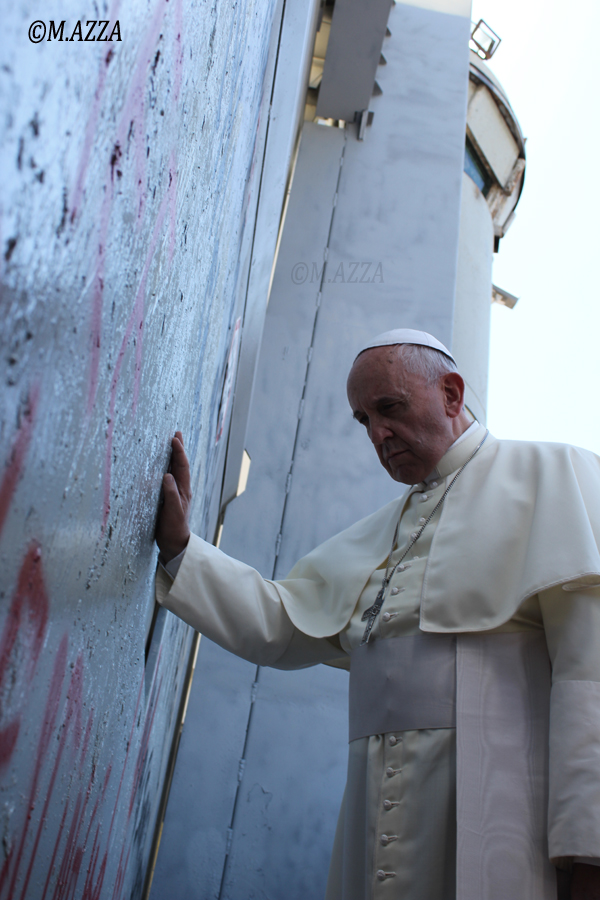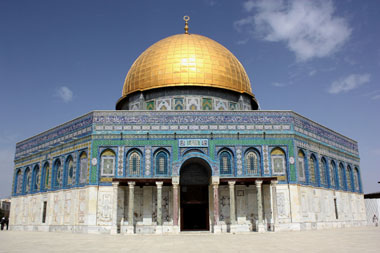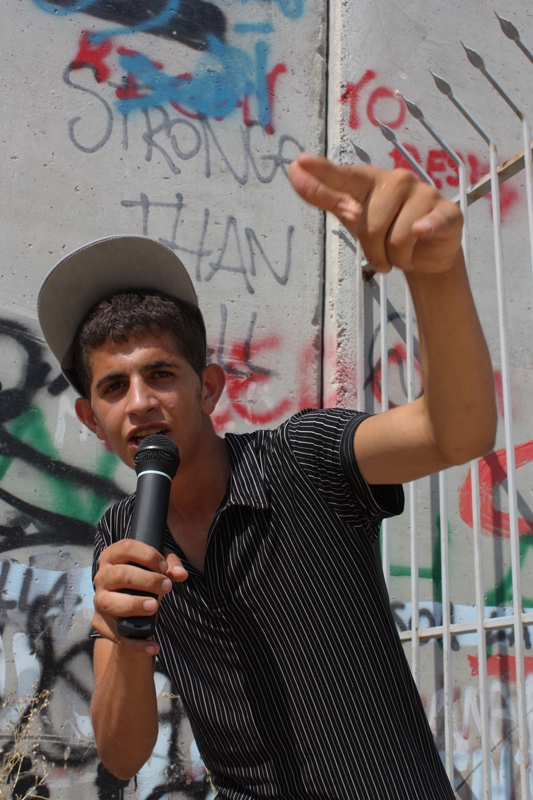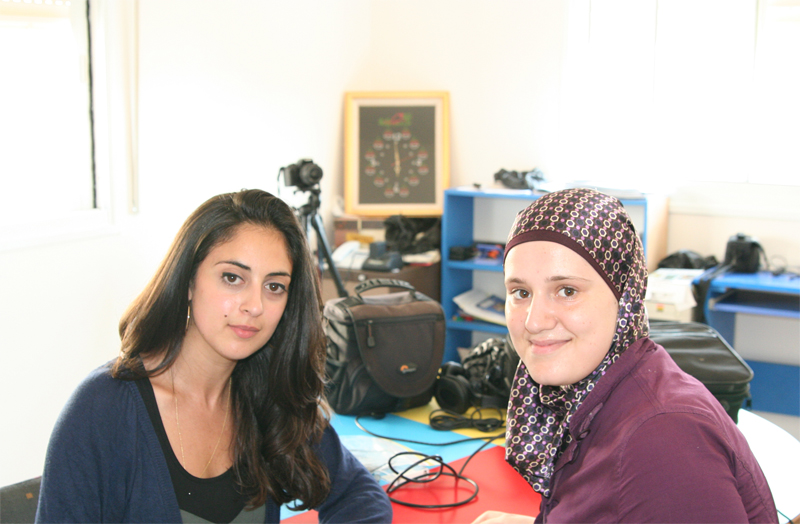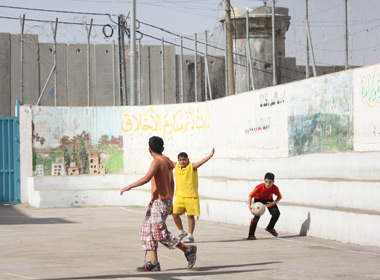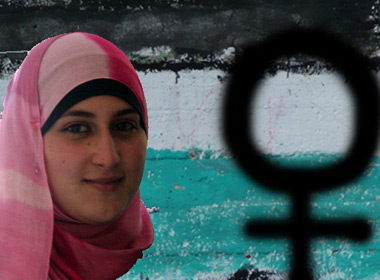I wanted to produce this story about the role of the Palestinian woman because I believe that people living outside the Arab world have the wrong idea about us.
The Palestinian woman is an integral part of our society. She participates in the Palestinian struggle just like any man. She has a major role in political, social and economic life.
She is the wife of the prisoner,
the nurse to the injured and handicapped,
the university student and professional
in many cases, the bread-winner
and always the mother, cook and cleaner.
And sometimes, Palestinian women are even political prisoners.
Khoula Al Azaraq is the Director of the Women’s Committee for Social Action in Bethlehem.
She is the mother of 2 boys and 2 girls
She has also served 4 years in prison for her political work with Fatah during the first Intifada.
How do you think the international community sees the Palestinian woman?
Khoula Al Azaraq:
I think that this picture is not clear enough. Most of the people outside of Palestine don’t know exactly what the Palestinian women are doing here in Palestine.
They just maybe see the TV and see some examples; the Palestinian mothers don’t care about their children, or they just play the traditional role, doing housework and taking care of the family. But I think we are in Palestine doing a lot as women. First of all, we share our national struggle against the occupation side by side with men. And, we participate in the political activities.
In the first Legislative Elections, 5 women won in that election and I think it is a good achievement even if the number is very little compared to the number of men…but if we compare this experience to other communities not suffering from political conflict – the women in some communities can’t even vote, let alone be members in any Legislative, Municipality or even Local Council. But in Palestine it was our first experience and we achieved something. Besides this, in 1996 in the local council elections again there are at least 2 women in all of the councils and in some councils all of the members are women and some of the municipalities are lead by women. And I think this is a big achievement and reflects the mentality and attitudes of the community – that the people in Palestine are ready to accept women in decision-making positions.
When we reach the 2006 elections, the number of women who won in the elections was 17 – I think this is a huge achievement even if some of these women are from religious parties but they are still women and they won. This community believes that women can play an effective role in all levels of life. That does not mean that we’ve achieved everything …we’ve achieved a little. But we need to continue and to work hard to have more achievements. There are still a lot of obstacles against women in Palestine. Palestine is an Arab community and Islamic community and there is a traditional culture which the people still believe – and there is a lot in this culture that is against women’s rights. But this kind of struggle it needs time and patience and a lot of belief that in the end we can change this kind of culture.
Linda Al Azzeh:
You said before that the international community has the wrong idea about Palestinian women. What do you think we can we do to change this perception?
Khoula Al Azaraq:
I think that it’s a responsibility for the Palestinians who are living outside or working outside to speak about the women’s struggle in Palestine and also for our foreign friends who are coming from their countries to visit Palestine and they can see for themselves what’s happening here in Palestine / what the people think. I think they can talk about their experience in an honest way and speak about what they are seeing exactly. For example; the issue of violence against women – I think this is a global issue. Some foreigners, some of the community in Europe and the United States try to say it is a third world issue. I think it is a global issue. In Europe there is still violence against women because she’s a woman. And I have made a lot of friends from France, Spain, Italy…and they talk about this issue and they say that a lot of women are suffering from violence. But in these communities there are clear laws, clear legislations that support women because these are stable communities. In Palestine there are not any legislations – Palestinian legislations, that support women that deal with women’s issues or family issues. We still use the Egyptian Laws in Gaza and Jordanian Laws in the West Bank and they are very old. We are as a Palestinian movement struggling to have our own legislation. We suggested a draft – all the women organizations signed this draft, and we gave it to the Palestinian Legislation Council and the Palestinian Government to study it and to formalise these legislations based on this document. Marriage, education, divorce, women’s marriage age – all of these things… but until now it hasn’t been adapted by the Parliament.
Linda Al Azzeh:
Many people are not aware of the fact that women were extremely active in the First Intifada. How vital was their involvement?
Khoula Al Azaraq:
I think all of the world outside who witnessed what was happening in Palestine during the First Intifada are aware that women played a major role in that Intifada: in demonstrations in supporting prisoner’s families / martyr’s families, in taking care of land, in the popular education when they closed the universities and schools – women they had a major role [in fact] we call it [the] Women’s Intifada. The women were leaders in that Intifada and many women were injured, arrested and killed in that Intifada. But in the Second Intifada the situation changed and this has affected women’s participation in this Intifada. But, in the first one (and I was active in that Intifada) women played a major role.
Linda Al Azzeh:
What message about Palestinian women would you like to tell to the world?
Khoula Al Azaraq:
I would like to say that Palestinian women strongly believe in a better future for their families for the whole Palestinian people and we deserve this future.
